

Glibc-debug-2.15_multilib-x86_64-9alien. Gcc linker error - hidden symbol `stat' in /usr/lib/libc_nonshared.a(stat.oS) Am getting this linker error from gcc on linux: hidden symbol `stat' in /usr/lib/libc_nonshared.a(stat.oS) is referenced by DSO The complaint is from my library, all objects rebuilt by v4.3.2 gcc and g++.

And yes some of the routines do call stat() apologies if this is a compiler/linker option that i've missed but am able to link on opensolaris and other platforms just fine, so wondered if is a linux-gcc issue that might already be answered here? I've tried a few options building my DSO... including -shared but it seems like stat() is a weak symbol that does not resolve? Thanks, /j here's some details if that helps... What .a libraries are needed for ch 5. What .a libraries are needed for ch 5. C compiler cannot create executables. Hi all i'm tring to install :slackware [Splashy] but whe i try to install freetype with .
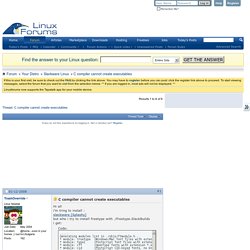
Index of /fatdog/packages/700/ Linux Copy File Command [ cp Command Examples ] Processor pipeline description - GNU Compiler Collection (GCC) Internals. 16.19.9 Specifying processor pipeline description To achieve better performance, most modern processors (super-pipelined, superscalar RISC, and VLIW processors) have many functional units on which several instructions can be executed simultaneously.
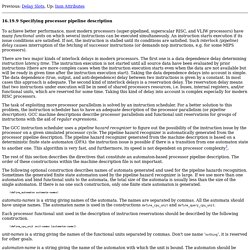
An instruction starts execution if its issue conditions are satisfied. If not, the instruction is stalled until its conditions are satisfied. Interlock (pipeline) delay causes interruption of the fetching of successor instructions (or demands nop instructions, e.g. for some MIPS processors). There are two major kinds of interlock delays in modern processors. Instruction latency time. Processor pipeline description - GNU Compiler Collection (GCC) Internals. 12.04 - cannot compile gcc or g++ libc_nonshared.a not recognized.
Ian Lance Taylor - Re: undefined references in libc_nonshared.a when linking .so. This is the mail archive of the gcc-help@gcc.gnu.org mailing list for the GCC project.
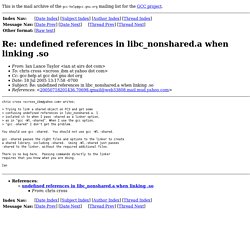
From: Ian Lance Taylor <ian at airs dot com>To: chris cross <xcross_ibm at yahoo dot com>Cc: gcc-help at gcc dot gnu dot orgDate: 18 Jul 2005 13:17:58 -0700Subject: Re: undefined references in libc_nonshared.a when linking .soReferences: <20050718201436.70698.qmail@web33808.mail.mud.yahoo.com> chris cross <xcross_ibm@yahoo.com> writes: > Trying to link a shared object on FC3 and get some > confusing undefined references in libc_nonshared.a.
I > isolated it to when I pass -shared as a linker option, > as in "gcc -Wl,-shared". Chris cross - undefined references in libc_nonshared.a when linking .so. Linux - How can I change the libraries that gcc uses when linking with /bin/ld? GCC, the GNU Compiler Collection - GNU Project - Free Software Foundation (FSF) How to tell puppyversion in Puppy 5? Hi Béèm, yep, is exactly what I wanted.
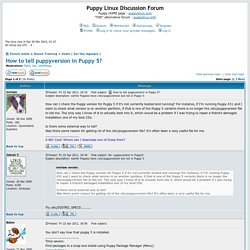
I needed to be able to find out what version a particular Puppy was that was on my (or a friend's) computer while having another version of Puppy running on that machine. For example, My main computer has Puppy 214, 431, and 520 Lucid all on different drives. If I was booted into Puppy 431, was cruising the net, and found something relating to a Puppy 5 and couldn't remember if it was relevant to my Puppy 5 install I would like to look at that Puppy to remind myself which it is without going through the whole rebooting process. There are other examples where this comes in handy. If I'm advising a friend or family member how to do something it is often crucial to know which version of Puppy is running on their machine.
Puppy Linux Fatdog64 : kirk. Fatdog64-620beta2. Hello Jamesbond The answers to your query: 1.
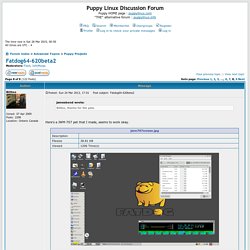
How does the machine access the SD card? Is it via in-built reader, or do you use external card reader connected via USB? How Puppy Works. HomePage > Components and HowTos How Puppy Works Latest Information Details One thing to understand is that Puppy is unique.
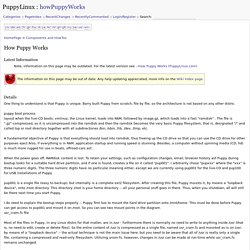
Barry built Puppy from scratch, file by file, so the architecture is not based on any other distro. puppy boot process layout when the live-CD boots: vmlinuz, the Linux kernel, loads into RAM, followed by image.gz, which loads into a fast "ramdisk" . A fundamental objective of Puppy is that everything should load into ramdisk, thus freeing up the CD drive so that you can use the CD drive for other purposes eject Also, if everything is in RAM, application startup and running speed is stunning. When the power goes off, RAMdisk content is lost. Pup001 is a single file (easy to backup), but internally is a complete ext2 filesystem. I do need to explain the bootup steps properly -- Puppy first has to mount the hard drive partition onto /mnt/home. Part of the diagram in an orange color to illustrate the different places where the file usr_cram.fs may be located.
Commands. Repositories.